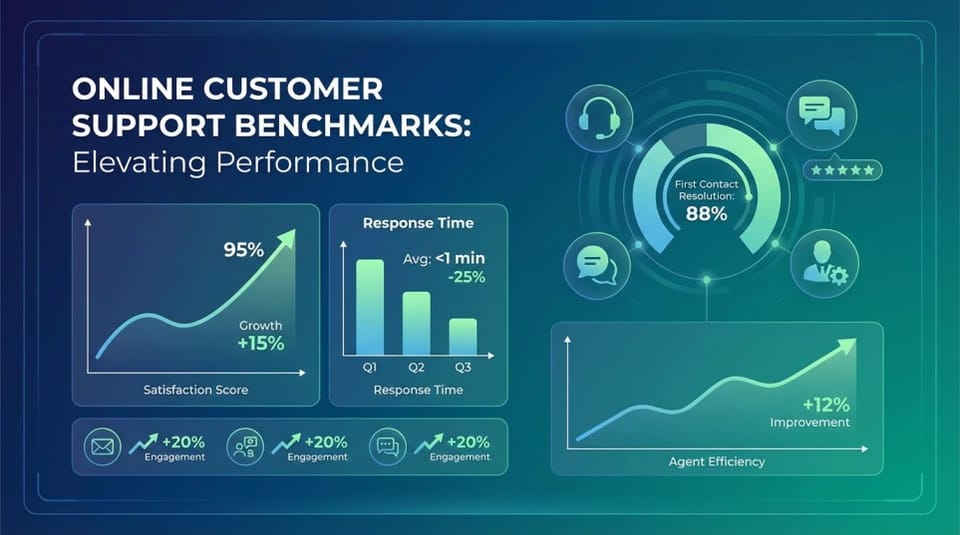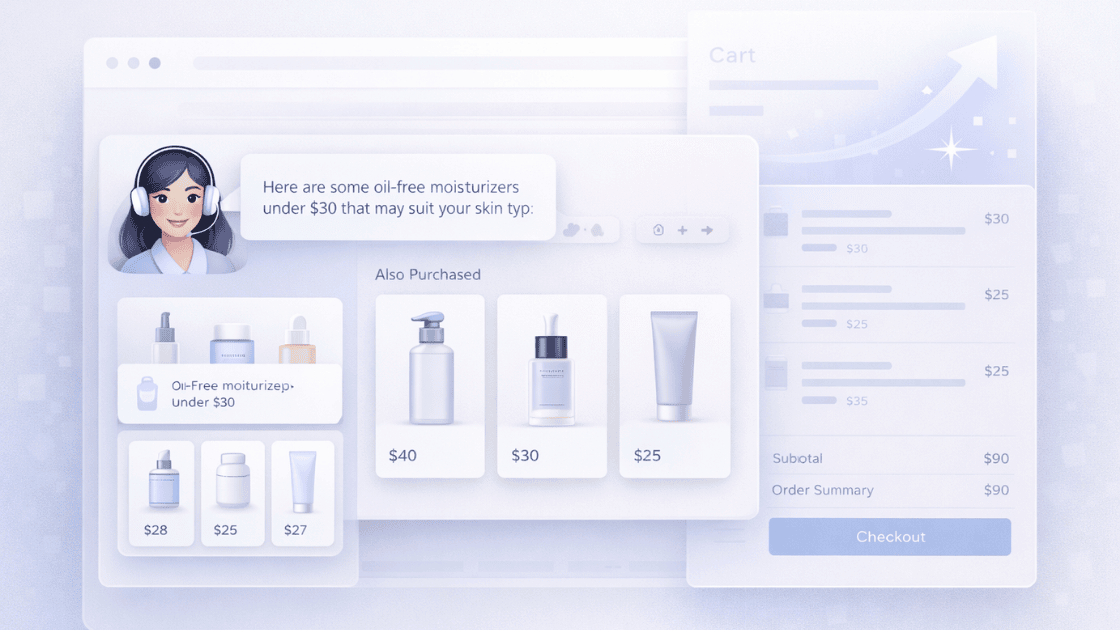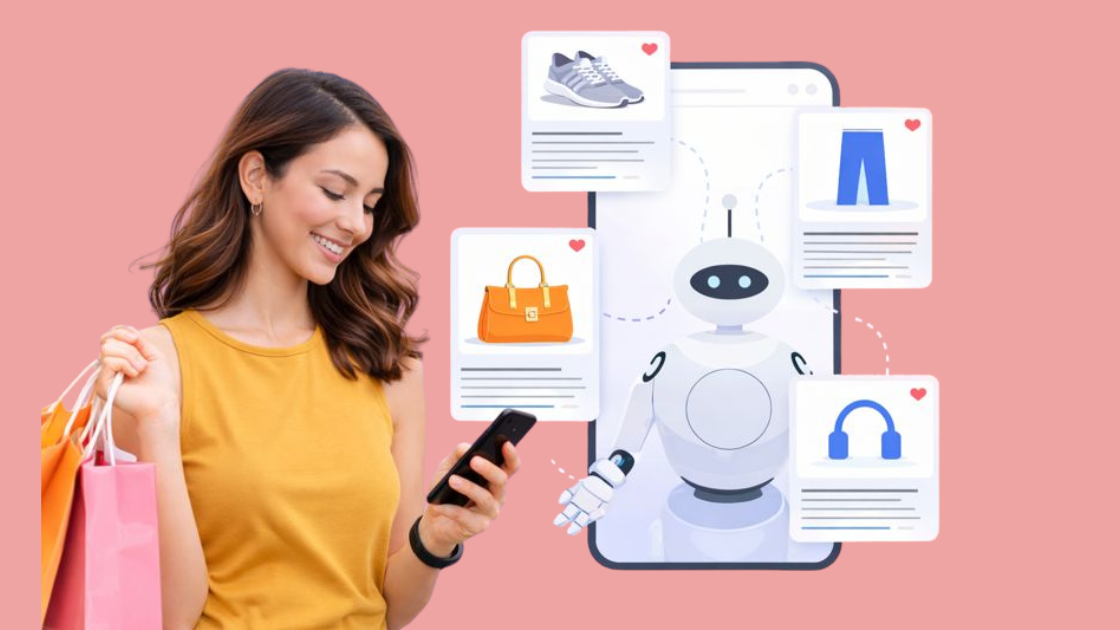Best Practices for Implementing Retail Chatbots to Boost Customer Engagement
Learn how advanced retail chatbots powered by Agentic AI boost customer engagement, personalize shopping, and drive sales for modern eCommerce brands.
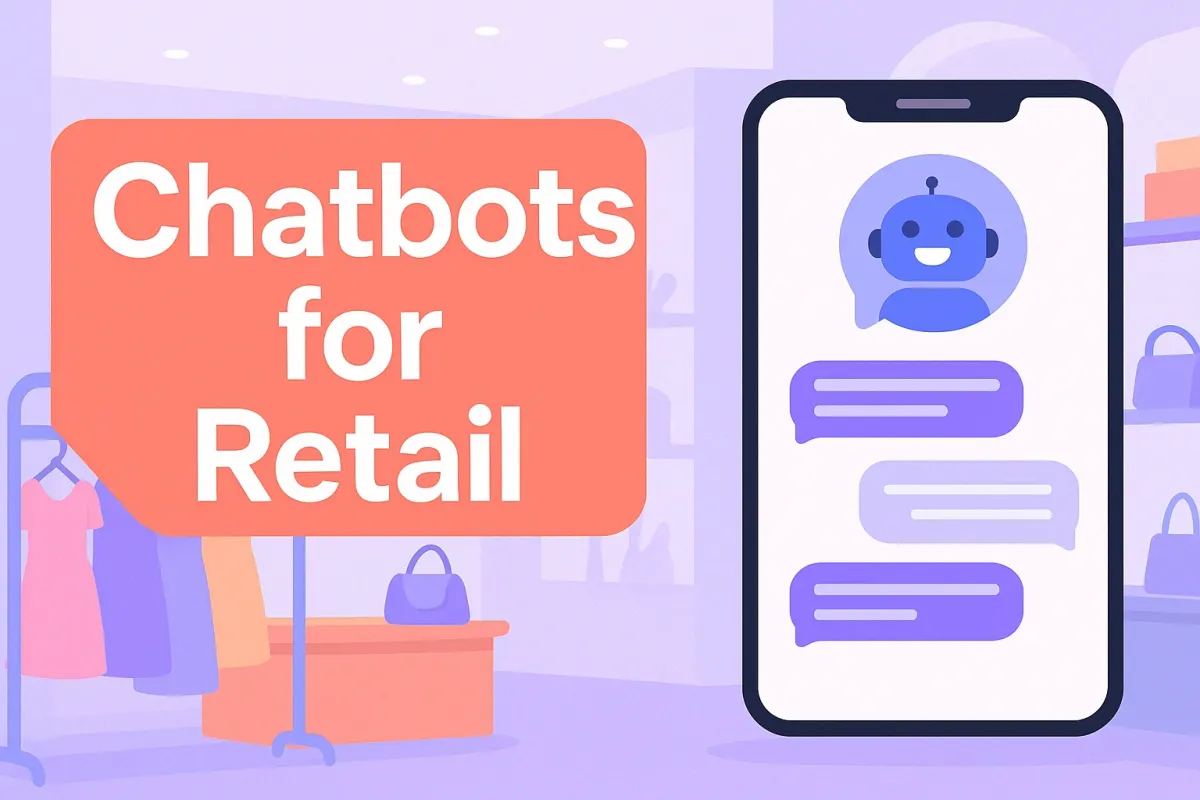
Ever wondered how leading retail industry brands are consistently delighting customers and boosting sales in an increasingly digital world?
The secret often lies in sophisticated AI-powered assistants. But we're not talking about basic chatbots of the past. Today, advanced retail chatbots, supercharged with Agentic AI and Retrieval Augmented Generation (RAG), are completely reshaping customer interactions, offering truly personalized support, and driving unprecedented growth.
This article will explore what these next-generation retail chatbots are, why they are indispensable for modern retailers, and how your business can leverage them effectively.
Key Takeaways
1) Retail chatbots transform the shopping experience by providing instant support, personalized recommendations, and 24/7 customer service, ultimately boosting engagement and loyalty.
2) Choosing the right chatbot platform is essential, with options like Tidio, IBM Watson Assistant, and Alhena offering various features tailored to improve customer interactions and streamline operations.
3) Best practices for implementing chatbots include understanding your audience, setting clear goals, and starting with simple functionalities to optimize customer experience and satisfaction over time.
What are Retail Chatbots?
Think of a retail chatbot as your most intelligent, tireless, and customer-focused virtual team member. In the past, chatbots were often limited to simple, pre-programmed responses. However, modern retail chatbots, especially those powered by Agentic AI, are a different breed. They are sophisticated AI systems designed to engage customers in natural, meaningful conversations across various touch points – your website, mobile app, social media, and even in-store.
These AI-powered assistants go far beyond just answering basic questions. They understand complex customer inquiries, provide personalized product recommendations, handle customer enquiries, guide shoppers through their customer journey, assist with order management, and offer instant support, 24/7. The key differentiator is their ability to learn, adapt, and act proactively, much like a human agent, but with the scalability and efficiency of AI.
Additionally, retail chatbots play a critical role - they enhance customer experience and drive loyalty through targeted promotions and support. This dual role of managing routine tasks and enhancing customer engagement makes retail bots a must-have for any forward-thinking retailer.
Why are Advanced AI Chatbots No Longer a Luxury, but a Necessity for Retailers?
In the super competitive retail sector, it's paramount to meet and exceed customer expectations. Customers today demand instant, personalized, and seamless interactions. Here’s why advanced AI chatbots are essential:
Elevating Customer Experience (CX):
They provide immediate, 24/7 support, ensuring no customer queries go unanswered. This instant gratification significantly boosts customer satisfaction and loyalty. The ability to offer personalized assistance based on customer data and customer preferences makes shoppers feel understood and valued.
Driving Sales Growth:
By guiding customers to the right products, offering personalized recommendations, and assisting with the purchase process, chatbots directly contribute to increased sales and higher conversion rates. They can proactively engage customers, recover abandoned carts, and upsell or cross-sell relevant items, maximizing revenue opportunities.
Enhancing Customer Engagement:
Modern chatbots create dynamic and interactive customer conversations, moving beyond transactional exchanges. They can share valuable content, run quizzes, gather feedback, and keep customers connected with the brand across various social media platforms and messaging apps, fostering a stronger sense of community and enhancing customer engagement.
Improving Operational Efficiency and Reducing Costs:
Chatbots automate a significant portion of customer interactions, freeing up human agents or customer service agents to handle more complex or sensitive issues. This reduces the burden on support teams, lowers operational costs, and allows businesses to scale their support without proportionally increasing headcount.
Gathering Valuable Customer Insights:
Every interaction with a chatbot is a data point. Retailers can analyze customer data from these conversations to gain deep insights into customer behavior, preferences, pain points, and emerging trends. This information is invaluable for optimizing products, services, marketing strategies, and the overall shopping experience.
Essentially, in an era where the customer journey is increasingly digital and expectations are sky-high, retail bots powered by Agentic AI and RAG are not just about cutting costs; they are strategic assets for building lasting customer relationships and achieving sustainable sales growth.
Top Retail Chatbot Platforms
When it comes to choosing the best retail chatbot platforms, several names stand out:
- Alhena
- Tidio
- IBM Watson Assistant
- Drift
These messaging platforms offer unique capabilities that cater to different aspects of customer engagement and service provider automation. They are designed to automate customer interactions, provide personalized assistance, and ultimately enhance customer experience. Understanding the strengths of each platform can help retailers select the one that best fits their needs.
Retail chatbots can be categorized into different types based on their capabilities and functions. From AI Shopping Assistants and Customer Support Assistants to Social Media Management bots, each type serves a specific purpose. Ecommerce businesses can significantly enhance customer engagement, streamline operations, and improve overall customer satisfaction by utilizing these platforms, including an ecommerce chatbot.
Alhena AI for Online Retail

Alhena offers a unified platform designed to cover all customer-facing interactions for retailers. It is the most comprehensive solution built for online retailers. This platform includes functionalities such as:
- AI Support Concierge – Automates post-purchase care (order tracking, returns) and complex Q&A.
- AI Shopping Assistant – Acts as a virtual shopping assistant that guides browsers to buyers with personalized recommendations.
- AI Social Commerce – Brings the same agentic intelligence to Instagram DMs, Pinterest, and TikTok comments.
- eCommerce Solution Suite – End-to-end toolkit to unify online and physical store experiences.
- Shopify Integration – One-click install for rapid go-live on the world’s leading commerce platform.
- Product Review Automation – Uses AI to auto-respond to reviews, boosting trust and SEO.
One of the key advantages of Alhena is its ability to drive revenue by helping users find products conversationally, thanks to its conversational search feature built into the chatbot.
With its deep focus on the online retail industry, it can provide deep integrations with eCommerce operation tools such as 3PL, Return, and CDP platforms. This focus allows Alhena to offer a seamless and efficient experience for both retailers and customers. Alhena ensures retailers can provide an exceptional shopping experience by automating customer services and driving revenue through personalized assistance. In our opinion, this makes Alhena the best retail chatbot out there.
Tidio
Tidio is a powerful platform that automates customer support and provides proactive service to enhance the shopping experience. With its user-friendly visual builder and pre-built templates, Tidio makes it easy for retailers to create custom chatbots without needing extensive technical knowledge. This ease of use, combined with advanced natural language processing (NLP) capabilities, allows Tidio’s chatbots to communicate effectively with customers, providing contextually relevant responses.
The advanced NLP features of Tidio enable it to understand and respond accurately to customer inquiries, analyzing shopper intent and context to provide real-time, personalized assistance. This ensures that customers receive accurate information and support, enhancing their overall shopping experience. Retailers can significantly improve customer engagement and satisfaction by harnessing these capabilities.
IBM Watson Assistant
IBM Watson Assistant is known for its ability to handle complex customer inquiries while ensuring data security. This platform implements visual recognition security and private cloud data storage to safeguard user data, making it a reliable choice for retailers concerned about privacy and security. The integration of machine learning enhances the chatbot’s ability to personalize customer experiences by analyzing past interactions and predicting future preferences.
With its robust AI capabilities, IBM Watson Assistant can provide personalized assistance and handle a wide range of customer queries. This makes it an ideal choice for retailers looking to enhance customer interaction and support. Retailers can ensure their customers receive accurate and timely information, thus improving overall satisfaction, by using IBM Watson Assistant.
Chatbots for In-Store Retail Experience
Chatbots are becoming innovative tools in physical retail stores. They're changing how you shop in actual stores. The chatbots used in real stores change how you find products and interact with store staff.
Retailers are making in-store experiences better by using chatbots. These chatbots help with customer service, make shopping easier, and give personalized suggestions.
Chatbots on In-Store Kiosks
One of the most visible applications of chatbots in retail is their integration into in-store kiosks. These chatbots serve as virtual assistants. They give customers quick information about products, store layouts, and promotions.
When you deploy chatbots on in-store kiosks, you can reduce customer waiting times and improve the customer experience. These chatbots offer instant help that's personalized for you. This approach streamlines shopping and allows staff to focus on more complex customer needs.
Chatbots on Websites with Product Locations
Chatbots play a crucial role on websites that have product locations. They help connect the online and offline retail experiences.
These chatbots help both online and in-store visitors. They locate both physical stores and products within those stores.
Using retail chatbots with online shopping is helpful. It makes the transition from online shopping to a physical store smoother. This way, customers researching online before buying in-store have a more connected experience.
Voice-to-Text/Text-to-Voice Enabled Chatbots
Voice-to-text and text-to-voice chatbots make retail more accessible. Retail AI chatbots let customers use voice commands, making shopping easier and more inclusive. These chatbots especially helpful for mobile device users or customers with visual impairments or limited mobility.
These chatbots turn text messages into spoken words and the other way around. This way, everyone can use retail platforms, making shopping accessible to all.
How Chatbots Assist Customers
Chatbots are vital in enhancing the customer experience in the in-store retail environment. These advanced tools help shoppers in many ways to make their shopping journey smooth, efficient, and enjoyable.
Here are some specific functions where chatbots prove invaluable:
- Locate Items Within the Store: Chatbots help customers quickly find the location of products within the store. When you ask about a product, you get directions to where it is. This saves time and makes your shopping experience better.
- Determine Item Availability: One important job of retail chatbots is to tell customers if products are available or not. They can instantly check if an item is in or out of stock, providing real-time inventory updates. This feature prevents customer frustration and enhances the efficiency of shopping.
- Getting Personalized Product Suggestions: A retail chatbot can suggest matching products, making consumers' shopping experiences more personalized.
- Ask for Help from a Live Customer Service Agent: Chatbots can easily send you to a real person when you need more help. This way, you get both the speed of AI and the personal touch of talking to a human, ensuring you get the help you need.
Chatbots for Online Retail Experience
Chatbots have become essential in refining the online shopping experience. They play a key role in giving personalized help and suggestions to people shopping online.
Online Retail chatbots have a wide range of applications that significantly enhance customer interactions and operational efficiency. These chatbots can provide support, process orders, and make personalized recommendations, transforming the shopping experience for customers. Conversational AI in chatbots streamlines support services, enabling customers to get the help they need quickly and efficiently.
The key applications of these online retail chatbots include customer support and shopping assistance. These chatbots can answer service questions, provide recommendations, upsell products, and guide customers through their purchases. Offering these personalized services allows chatbots to improve customer engagement and satisfaction, fostering stronger brand loyalty and higher transaction values.
Customer Support:
Retail chatbots have become essential for streamlining customer support by providing quick and accurate responses to common queries. These chatbots automate routine tasks, allowing human agents to focus on more complex customer issues, significantly reducing response time. This automation improves customer engagement by facilitating direct interactions and collecting feedback efficiently.
Retail chatbots enhance customer interactions and satisfaction by providing immediate assistance and accurate information. They enable retailers to offer exceptional customer service, ensuring that customers have positive experiences and are more likely to return. This leads to improved customer loyalty and overall business performance.
Shopping Assistant
AI-powered shopping assistants and virtual shopping assistants play a crucial role in providing personalized recommendations and guiding customers through the purchasing process. These assistants ask insightful questions to understand shoppers’ needs and preferences, much like a helpful friend, ensuring that customers find the perfect product. This personalized shopping experience enhances the shopping experience and increases customer satisfaction.
Additionally, shopping assistants can automatically generate FAQs tailored to each product, anticipating customer questions and driving support efficiency. Smart gentle nudges help speed up the sales process by offering helpful prompts or enticing deals when shoppers hesitate during their online shopping. These features ensure that we assist customers in having a seamless and enjoyable shopping journey.
Product Recommendations
Retail chatbots gather insights from customer data, enabling more effective marketing strategies and personalized shopping experiences. By analyzing customer preferences and past behavior, chatbots can provide personalized product recommendations that fit user tastes. This personalization increases the average order value and contributes to revenue growth.
Advanced AI and machine learning algorithms play a crucial role in enhancing product recommendations. By analyzing customer browsing and purchase history, chatbots can suggest items that are likely to appeal to the customer. This not only improves customer satisfaction but also boosts sales and customer loyalty.
Order Tracking and Notifications
Chatbots can proactively communicate updates about order statuses to keep customers informed. Customers receive personalized updates on order progress, delivery times, and shipping status changes, ensuring transparency and reducing anxiety. Efficient order tracking through chatbots ensures proactive communication and enhances customer satisfaction.
Puffy’s chatbot, for example, assists with order tracking and returns, streamlining the post-purchase process for customers. This proactive communication helps build trust and ensures that customers have a positive shopping experience from start to finish.
By providing real-time order updates, chatbots enhance the overall customer journey.
Loyalty Programs and Offers
They inform customers about loyalty programs. They also mention discounts and special offers. This encourages customers to buy again.
Feedback Collection
Chatbots collect important feedback from customers. Businesses use this feedback to make their products and services better.
| Capability | Why It Matters for the Retail Journey |
|---|---|
| Advanced NLP + RAG | Combines deep language understanding with real-time retrieval of product, inventory and policy data to deliver accurate answers at scale. |
| Agentic Workflows | Lets the bot trigger returns, exchanges, promotions, or loyalty look-ups—removing friction from the purchase process and boosting conversion rates. |
| Personalized Recommendations | Cross-references shopping history and live browsing to suggest add-ons, increasing average order value and sales growth. |
| Omnichannel Presence | One brain across web chat, mobile apps, messaging apps, social DMs, and voice enables continuous improvement and consistent tone. |
| Seamless Integrations | API-level connections to Shopify, Freshdesk, Narvar and more keep data in sync and avoid “swivel-chair” support. |
| Analytics & Feedback Loops | Every solved ticket feeds the RAG index, letting you analyze customer data for product gaps and content improvements. |
15 Must-Have Features for an Effective Online Retail Chatbot
The integration of chatbots in the online retail sector significantly boosts customer satisfaction. Here are 15 criteria for selecting an ecommerce chatbot:
- Generative AI: An online retail chatbot should use generative AI. Generative AI will enable the chatbot to understand complex customer questions and create highly relevant answers.
- Accuracy and Relevance: A retail chatbot should customer trust with consistently correct and valuable information. In other words, it shouldn't hallucinate.
Watch Now: Alhena AI vs. a GPT trained on the same knowledge. The GPT hallucinates, but Alhena AI doesn't.
- Ecommerce Platform Integration: It connects smoothly with Shopify, Magento, and WooCommerce. This helps you to use the store and data in the best way.
- Product Expertise: It answers product details, availability, and specifications questions. It does this just like a knowledgeable sales assistant.
- Multilingual Service: The chatbot should be fluent in multiple languages, enhancing customer engagement across global markets.
- Real-time Pricing: Ensures trust with always-updated pricing, enhancing brand credibility and professionalism.
- Personalized Suggestions: Offers tailored product recommendations based on customer history, boosting sales potential.
- Live Agent Handoff: It helps move the conversation to human agents in complex situations. This makes sure to meet customer satisfaction.
- Help Desk Compatibility: It works together with platforms like Freshdesk and Zendesk. This makes support smooth and efficient.
- Continuous Catalog Updates: Regularly refreshes product information, keeping the chatbot current and accurate.
- Data Security: Adheres to top-tier security standards (SOC 2 Type 2) for customer data protection.
- Customizability: You can customize responses, appearance, and tone. This helps match your brand's style and personality.
- Buying Intent Recognition: Identifies when someone is ready to buy. Then, you can smoothly guide them to checkout or to a live sales agent.
- Dynamic Q&A Capability: It can flexibly handle many different questions. This shows how adaptable and smart the chatbot is.
- Customer Satisfaction Objective: The chatbot should always try to maximize customer satisfaction. This helps build trust and maintain the brand's integrity.
Case Studies: Successful Retail Chatbot Implementations
Real-world examples of chatbot implementations provide valuable insights into how retailers can enhance customer engagement and improve sales performance. Successful implementations by companies like Crocus, Tatcha and Puffy demonstrate the potential of chatbots to foster better relationships with customers and increase sales. Examining these case studies allows retailers to learn best practices and strategies for implementing their own chatbots.
Tatcha utilizes chatbots to deliver personalized beauty advice and product recommendations, significantly enhancing the shopping experience for customers. Puffy - An online luxury Mattress seller employs a chatbot strategy focused on improving customer support and driving sales through personalized interactions, thereby enhancing the overall shopping experience.
These examples highlight the transformative impact of retail chatbot examples on ecommerce chatbot examples.
Crocus: Seasonal Plant Retailer Deflects 86 % of Tickets
Crocus faced triple ticket volumes each spring. After deploying Alhena’s AI Support Concierge, the brand:
1) Deflects 86 % of tickets with AI-only replies.
2) Raised CSAT to 84 %.
3) Cut seasonal hiring costs by reducing live-agent escalations to just 3.7 %.
“Alhena AI is helping us deliver the kind of customer service that we know makes a real difference”

Ben O’Donnell
Head of Customer Service at Crocus
Puffy: Luxury Mattress Brand Resolves 63 % Inquiries with 90 % CSAT
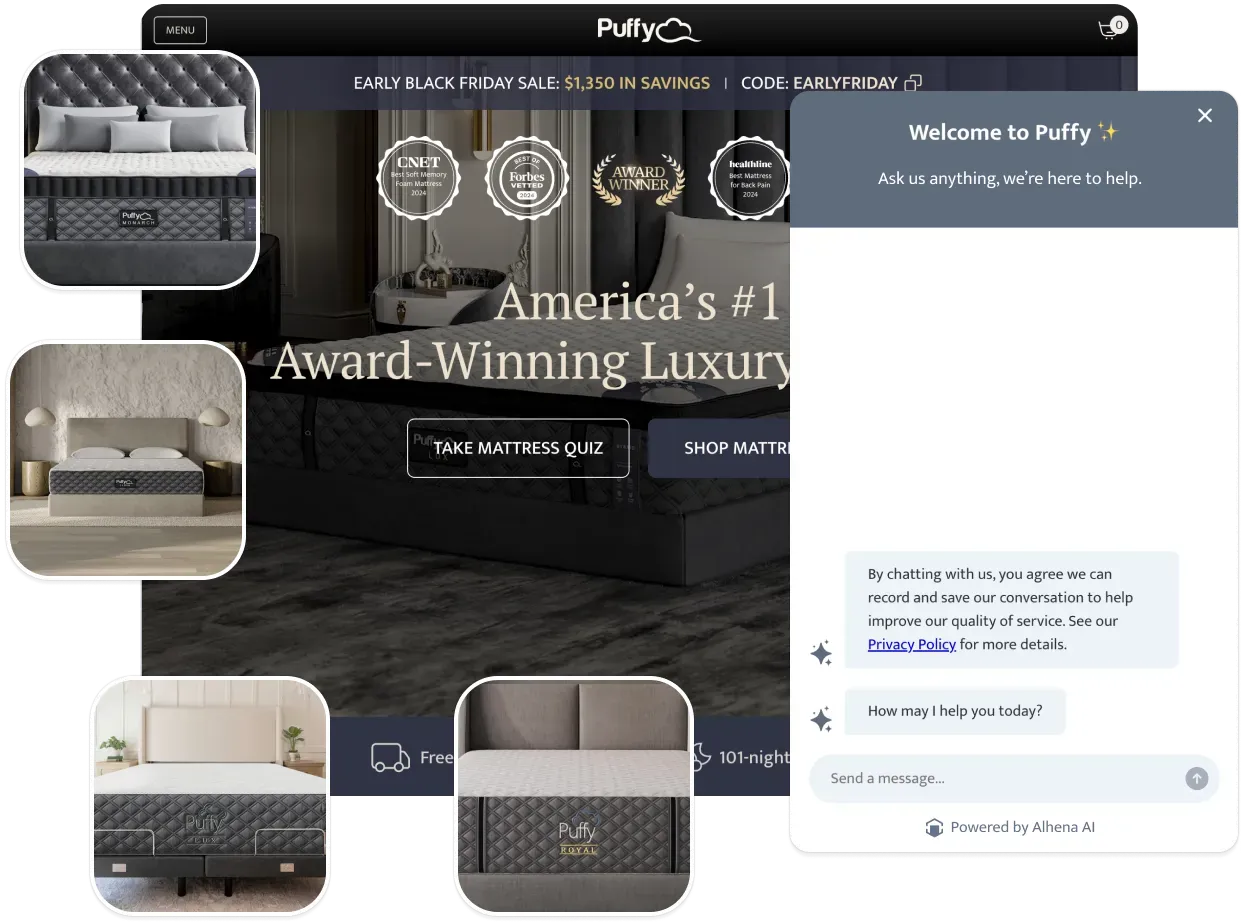
Puffy switched from a basic workflow bot to Alhena’s agentic model:
1) 63 % of all email and chat inquiries fully resolved by AI.
2) Maintains 90 % CSAT—matching human-only levels.
3) Phased rollout (email → live chat) proved safe and cost-effective.
“Alhena AI has far exceeded our expectations, and we would recommend it to anyone”

Harendra Parihar
Marketing Specialist
Future Trends in Retail Chatbots
The chatbot market is projected to grow significantly, with a compound annual growth rate (CAGR) of 23.3% from 2025 to 2030. Chatbots are increasingly being enhanced with AI capabilities, allowing for more personalized customer interactions and improved service efficiency. Future retail chatbots will leverage generative AI to provide personalized and dynamic responses, enhancing customer interactions.
The increasing integration of augmented and virtual reality with chatbots is expected to revolutionize customer engagement by enabling immersive shopping experiences. Retail chatbots can also send personalized notifications to customers about new products based on their buying history, further enhancing the customer experience. These trends highlight the ongoing evolution of retail chatbots and their growing importance in the retail sector.
Integration with Social Media Platforms
Integrating retail chatbots with social media platforms is crucial for engaging customers and enhancing a brand’s social media presence. This integration allows businesses to connect with customers where they spend most of their time, increasing engagement and satisfaction. Social media retail chatbots can initiate conversations, answer inquiries, and provide personalized assistance, making them a powerful tool for customer interaction.
Leveraging social media platforms ensures that retailers’ chatbots reach a broader audience and provide seamless integration customer support across various channels, including Facebook Messenger. This integration ensures that customers receive timely and relevant information, enhancing their overall experience and driving brand loyalty.
Summary
Retail chatbots have emerged as powerful tools for enhancing customer engagement and driving sales in the retail sector. By providing personalized assistance, streamlining support services, and leveraging advanced AI capabilities, chatbots transform the shopping experience for customers. The key to successful implementation lies in understanding audience needs, setting clear goals, and continuously evaluating performance. As we look to the future, the integration of social media platforms and advanced NLP will further enhance the capabilities of retail chatbots, making them indispensable for modern retailers. Embrace the power of chatbots and watch your retail business thrive.
Ready to Build an AI Chatbot for Your Retail Store?
At Alhena, we are leading the industry in transforming the customer support using an Agentic AI architecture.
- Learn More: Alhena AI For ECommerce
- Create and Test Your Own AI Agent for Free: Sign Up
- Read Customer Success Stories: Customer Success stories
Retail Chatbots FAQ
What are retail chatbots?
Retail chatbots are your smart shopping buddies that help with customer support, handle orders and offer personalized product suggestions to enhance the shopping experience. They’re all about making your shopping easier and more enjoyable!
How do retail chatbots enhance customer engagement?
By offering 24/7 personalized assistance, chatbots answer questions instantly, transfer to human agents only when necessary, and create a sense of being valued— driving higher satisfaction and loyalty.
What are some top retail chatbot platforms?
Alhena, Tidio, and IBM Watson Assistant are standout options for automating interactions and personalizing support in retail.
How can retailers implement chatbots effectively?
Know your audience, set clear goals, start with core use-cases, then expand features while monitoring performance. This phased approach ensures smooth adoption and stronger engagement.
What future trends can we expect in retail chatbots?
Expect tighter social-media integration, more advanced AI for deeper intent understanding, and immersive AR/VR shopping experiences.
Can a chatbot really handle complex customer queries?
Yes. Alhena’s agentic framework decomposes multi-step inquiries (e.g., check warranty → generate return label → update CRM) into sub-tasks and resolves them autonomously.
Do I lose control over brand voice?
No. Style guidelines and guardrails keep every response on-brand while eliminating hallucinations.
How fast can I deploy a retail chatbot on Shopify?
With Alhena’s pre-built connector, most brands launch in hours, not days.
Will AI replace my human agents?
It augments them—handling repetitive tasks so agents can focus on high-value interactions that demand empathy or negotiation.
Is my customer data secure?
Look for enterprise-grade encryption and scoped access to stay compliant with GDPR, SOC 2 and other standards.
Can the bot learn from social media conversations?
Yes. Integrations stream real-time social content to refine intent detection and sentiment models continuously.
How does continuous improvement work?
The bot periodically re-indexes resolved chats, retraining its RAG corpus and surfacing content gaps for your team to address.
